
ACS Food Science & Technology
Scope & Guideline
Advancing Knowledge at the Intersection of Food and Science
Introduction
Aims and Scopes
- Food Safety and Quality Control:
Research in this area emphasizes methodologies and technologies for detecting contaminants, assessing food safety, and extending shelf life through innovative preservation techniques. - Nutritional Enhancement and Functional Foods:
Studies focusing on the enhancement of food nutritional profiles through bioactive compounds, fortification, and the development of functional foods that promote health benefits. - Food Processing and Technology Innovations:
Exploration of novel food processing techniques including high-pressure processing, microwave-assisted extraction, and nanotechnology applications in food systems. - Sustainable Food Production Practices:
Research aimed at improving sustainability in food production through innovative uses of byproducts, alternative protein sources, and environmentally friendly packaging materials. - Food Chemistry and Biochemistry:
Investigations into the chemical and biochemical interactions in food systems, including flavor development, nutritional bioavailability, and the impact of processing on food constituents.
Trending and Emerging
- Plant-Based and Alternative Proteins:
An increasing focus on plant-derived proteins and alternative protein sources reflects consumer trends toward vegetarian and vegan diets, as well as sustainability in food production. - Smart Packaging Technologies:
Research into intelligent packaging solutions that monitor food quality and safety is on the rise, driven by advancements in materials science and consumer demand for transparency. - Functional Ingredients and Nutraceuticals:
Emerging studies on bioactive compounds and their health benefits highlight a growing interest in functional foods that support health and wellness. - Microbiome and Gut Health:
Research connecting food, gut microbiota, and overall health is gaining momentum, as the role of gut health in disease prevention becomes more recognized. - Sustainable Waste Management and Upcycling:
Innovative approaches to utilizing food waste and byproducts for value-added products are trending, aligning with global sustainability goals.
Declining or Waning
- Traditional Food Preservation Methods:
There has been a noticeable decrease in research related to conventional food preservation techniques such as canning and pickling, likely due to the rise of modern preservation technologies. - Synthetic Food Additives:
Research on artificial food additives is diminishing as consumer demand shifts towards natural and clean-label products, leading to a decline in studies focused on synthetic chemicals. - Conventional Farming Practices:
Interest in traditional farming and agricultural practices is waning in favor of studies focusing on organic farming, regenerative agriculture, and sustainable practices that align with contemporary environmental concerns.
Similar Journals
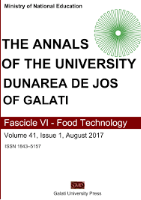
Annals of the University Dunarea de Jos of Galati, Fascicle VI-Food Technology
Empowering Knowledge in Food ProcessingAnnals of the University Dunarea de Jos of Galati, Fascicle VI-Food Technology is a distinguished academic journal published by GALATI UNIV PRESS, dedicated to advancing knowledge in the field of food technology. With an open access format since 2007, this journal enhances accessibility to research findings and facilitates the dissemination of innovative ideas among researchers, professionals, and students worldwide. The journal holds a noteworthy position in its category, boasting a 2023 Q3 ranking in both Food Science and Industrial and Manufacturing Engineering, indicating its relevance and contribution to these critical fields. As it converges years of publication from 2012 to 2023, it encapsulates an evolving body of knowledge that reflects the latest advancements and research trends. Although it may not yet have a defined HIndex, its presence in Scopus with ranks of #253 in Industrial and Manufacturing Engineering and #278 in Food Science underscores its emerging impact. This journal is particularly significant for those engaged in research related to food technology and engineering, facilitating dialogue and collaboration within the community while addressing pressing challenges and innovations in food processing and safety. With its commitment to quality research, Annals of the University Dunarea de Jos of Galati serves as an essential resource for fostering knowledge and promoting scientific discussion.
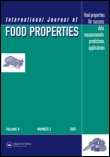
INTERNATIONAL JOURNAL OF FOOD PROPERTIES
Innovating through research in food properties.INTERNATIONAL JOURNAL OF FOOD PROPERTIES, published by TAYLOR & FRANCIS INC, is a leading platform for disseminating high-quality research in the field of food science. With an ISSN of 1094-2912 and E-ISSN of 1532-2386, this journal has been committed to open access since 2018, ensuring that groundbreaking studies are readily available to global audiences. The journal has steadily gained recognition for its contribution to the discipline, achieving a Q2 ranking in Food Science and placing in the 68th percentile among its peers according to Scopus metrics. Covering a wide array of topics related to the properties and applications of food, it serves as a valuable resource for researchers, professionals, and students alike. With coverage extending from 1998 to 2024, the journal continually seeks to advance knowledge and foster innovation within the food science community, making it a pivotal publication for anyone serious about this vital field.

Applied Food Research
Exploring the Frontiers of Food Safety and NutritionApplied Food Research, published by Elsevier, is an esteemed journal that plays a critical role in advancing the field of Food Science. With an ISSN of 2772-5022, the journal has established itself as a premier outlet for high-quality research, achieving a commendable Q1 ranking in the 2023 Food Science category and a 63rd percentile in Scopus rankings for Agricultural and Biological Sciences. Covering a diverse range of topics from food safety to innovative processing techniques, Applied Food Research seeks to publish pioneering studies that enhance our understanding of food systems and contribute to broader discussions on sustainability and nutrition. As it converges on its fourth year of publication, researchers, professionals, and students alike are encouraged to engage with its content through various open access options, ensuring widespread dissemination of knowledge in a field that is vital to global health and well-being. Operating out of Amsterdam, Netherlands, this journal is poised to be an indispensable resource for anyone dedicated to making significant contributions in the domain of food science.

Acta Scientiarum Polonorum-Technologia Alimentaria
Championing Quality and Sustainability in Food TechnologyActa Scientiarum Polonorum-Technologia Alimentaria, published by Poznan University of Life Sciences, is a revered journal in the field of food science, showcasing cutting-edge research and innovations in food technology. Established as a leading platform within its domain, this journal is indexed under Scopus and ranks in the 2023 Q3 quartile for Food Science, demonstrating its commitment to high-quality scholarship. With an ISSN of 1644-0730 and E-ISSN 1898-9594, it serves as a critical resource for researchers, professionals, and students seeking to stay at the forefront of advancements in food safety, quality control, and sustainable practices. The journal has also been recognized for its contributions to the agricultural and biological sciences, positioning itself at rank #205 out of 389 in this competitive field. While currently not offering open access, the journal's valuable insights and findings, especially as it publishes through 2024, play a crucial role in advancing knowledge and fostering collaboration among experts in the food science sector.
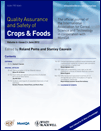
Quality Assurance and Safety of Crops & Foods
Bridging the gap between agriculture and food safety.Quality Assurance and Safety of Crops & Foods is a leading peer-reviewed journal, published by CODON PUBLICATIONS, dedicated to advancing the fields of Agronomy and Crop Science and Food Science. Since its inception in 2009, this journal has established itself as a crucial platform for researchers, professionals, and students, focusing on the vital intersection of agricultural safety and food quality. With a commendable impact factor and a current Scopus ranking placing it in the top quartiles of its field (Q2 in 2023), it serves as an essential resource for those committed to ensuring the safety and quality of global food supplies. The journal provides open access options to enhance the dissemination and accessibility of research findings, thus fostering collaborative efforts to tackle contemporary challenges in food production and safety. By showcasing innovative methodologies and cutting-edge research, Quality Assurance and Safety of Crops & Foods not only contributes to scientific discourse but also plays a pivotal role in informing policy and practice in sustainable agricultural practices.

FOOD TECHNOLOGY AND BIOTECHNOLOGY
Advancing the Future of Food Science and BiotechnologyFOOD TECHNOLOGY AND BIOTECHNOLOGY is a distinguished peer-reviewed journal published by the Faculty of Food Technology and Biotechnology, University of Zagreb, Croatia. Since its inception in 1993, this Open Access journal has become a crucial platform for disseminating innovative research in the fields of food science, biotechnology, and chemical engineering. With a commendable impact factor and consistent Q2 and Q3 rankings across multiple categories—including Biotechnology, Food Science, and Industrial Engineering—this journal not only fosters academic discussions but also addresses real-world challenges in food production, safety, and sustainability. As it converges its thematic scope from 1996 to 2024, FOOD TECHNOLOGY AND BIOTECHNOLOGY remains committed to advancing knowledge through high-quality research and interdisciplinary collaboration, making it an essential resource for researchers, professionals, and students seeking to stay at the forefront of food innovation and biotechnology.

Current Research in Food Science
Leading the Charge in Food Science AdvancementsCurrent Research in Food Science is a leading peer-reviewed academic journal published by Elsevier, specializing in the dynamic field of food science. Since its transition to an Open Access model in 2019, the journal has broadened its reach, contributing significantly to the dissemination of high-quality research. With strong rankings, including a Q1 quartile status in Applied Microbiology and Biotechnology, Biotechnology, and Food Science, it stands out as a pivotal resource for scholars. Based in the Netherlands, current research published within its pages spans a wide range of relevant topics, ensuring that researchers and practitioners stay abreast of the latest advancements. The journal's impressive Scopus rankings enhance its credibility, with a percentile standing in the 74th to 83rd range across relevant categories, underscoring its impact and importance in the academic community. Current Research in Food Science aims to foster the exchange of innovative ideas and foster collaborative efforts among researchers, making it an essential resource for those engaged in advancing the science and technology of food.
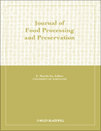
JOURNAL OF FOOD PROCESSING AND PRESERVATION
Pioneering Research for Sustainable Food PracticesJOURNAL OF FOOD PROCESSING AND PRESERVATION, published by Wiley-Hindawi, stands as a vital resource within the fields of Food Science, Chemical Engineering, and Chemistry. With an ISSN of 0145-8892 and an E-ISSN of 1745-4549, the journal has been a beacon of knowledge since its inception in 1977, continuing to provide valuable insights to the research community until 2024. Recognized for its quality, it holds a noteworthy Q2 ranking in 2023 across multiple categories, including Food Science and Chemical Engineering, indicating its influential contribution to the academic discourse. Although it offers no open access, the journal remains a crucial platform for disseminating groundbreaking research and innovative methodologies in food processing and preservation. Researchers, professionals, and students can significantly benefit from its comprehensive reviews, original research articles, and case studies, aimed at advancing knowledge and practices in food technology. By bridging the gap between theoretical advancements and practical applications, the JOURNAL OF FOOD PROCESSING AND PRESERVATION plays an essential role in addressing global food safety, sustainability, and quality challenges.

Ukrainian Food Journal
Fostering collaboration in food science and biochemistry.Ukrainian Food Journal is an esteemed open-access journal dedicated to advancing the field of food science and biochemistry. Established in 2012 and published by the National University of Food Technologies in Ukraine, the journal serves as a vital platform for researchers and professionals to disseminate their findings on food technology, safety, and nutritional biochemistry. With an ISSN of 2304-974X and E-ISSN 2313-5891, it offers a wealth of knowledge to its readers, promoting innovation and collaboration within the industry. While currently categorized within the Q4 quartile of biochemistry and the Q3 quartile of food science, the journal is progressively gaining recognition, reflecting a commitment to quality research in a competitive field. The journal is indexed in Scopus, ranking #271 in Food Science and #376 in Biochemistry, underscoring its relevance and contribution to agricultural and biological sciences. The Ukrainian Food Journal not only enriches the academic community with its open-access model but also aims to foster dialogue among researchers, professionals, and students dedicated to improving food systems and nutrition. It operates from its headquarters in Kyiv, offering a hub for creativity and advancement in food-related research.
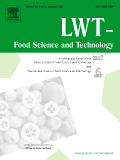
LWT-FOOD SCIENCE AND TECHNOLOGY
Pioneering research in food preservation and processing.LWT - Food Science and Technology is a premier academic journal published by Elsevier, specializing in the multifaceted fields of food science and technology. With a distinguished presence since its inception in 1973, this journal has evolved to become a vital resource for researchers and professionals aiming to advance knowledge in food safety, preservation, processing, and sensory analysis. Currently ranked in the Q1 quartile of food science journals, it holds an impressive Scopus ranking of 22 out of 389 in the Agricultural and Biological Sciences category, placing it in the 94th percentile. While certain articles may be available via subscription, LWT is committed to disseminating cutting-edge research that enhances food quality and innovation. This journal not only serves as a critical platform for the exchange of scientific ideas but also addresses contemporary challenges in food technology, ensuring that it remains essential for scholars, industry professionals, and students alike seeking to contribute to and stay abreast of advancements in the field.